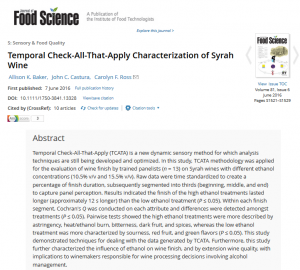Temporal Check-All-That-Apply characterization of Syrah wine
 Temporal Check-All-That-Apply (TCATA) is a new dynamic sensory method for which analysis techniques are still being developed and optimized. In this study, TCATA methodology was applied for the evaluation of wine finish by trained panelists (n = 13) on Syrah wines with different ethanol concentrations (10.5% v/v and 15.5% v/v). Raw data were time standardized to create a percentage of finish duration, subsequently segmented into thirds (beginning, middle, and end) to capture panel perception.
Temporal Check-All-That-Apply (TCATA) is a new dynamic sensory method for which analysis techniques are still being developed and optimized. In this study, TCATA methodology was applied for the evaluation of wine finish by trained panelists (n = 13) on Syrah wines with different ethanol concentrations (10.5% v/v and 15.5% v/v). Raw data were time standardized to create a percentage of finish duration, subsequently segmented into thirds (beginning, middle, and end) to capture panel perception.
Results indicated the finish of the high ethanol treatments lasted longer (approximately 12 s longer) than the low ethanol treatment (P ≤ 0.05). Within each finish segment, Cochran’s Q was conducted on each attribute and differences were detected amongst treatments (P ≤ 0.05). Pairwise tests showed the high ethanol treatments were more described by astringency, heat/ethanol burn, bitterness, dark fruit, and spices, whereas the low ethanol treatment was more characterized by sourness, red fruit, and green flavors (P ≤ 0.05). This study demonstrated techniques for dealing with the data generated by TCATA. Furthermore, this study further characterized the influence of ethanol on wine finish, and by extension wine quality, with implications to winemakers responsible for wine processing decisions involving alcohol management.
Practical Application
Effective temporal descriptive sensory methods are essential in order to accurately characterize attributes that change over time. This paper introduces the Temporal Check-All-That-Apply (TCATA) methodology for performing a dynamic characterization of wine finish, which has a complex evolution of sensations. The methods of standardization, time segmentation, and statistical analyses expand upon the current TCATA methodology and the understanding of wine finish.
![]()
Baker, A. K, Castura, J. C., & Ross, C. F. (2016). Temporal check-all-that-apply characterization of Syrah wine. Journal of Food Science, 81, S1521–S1529.